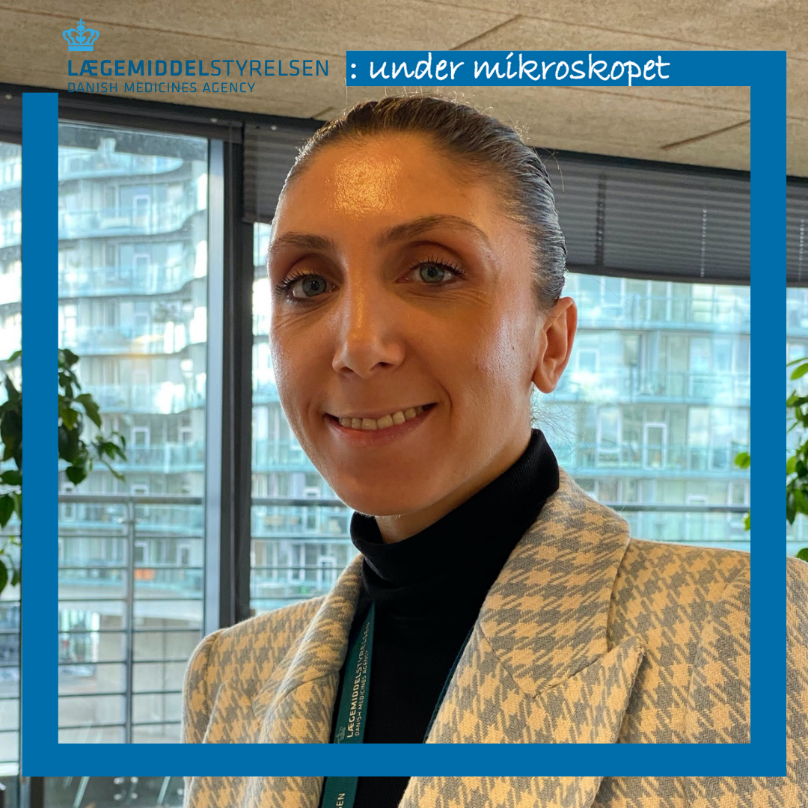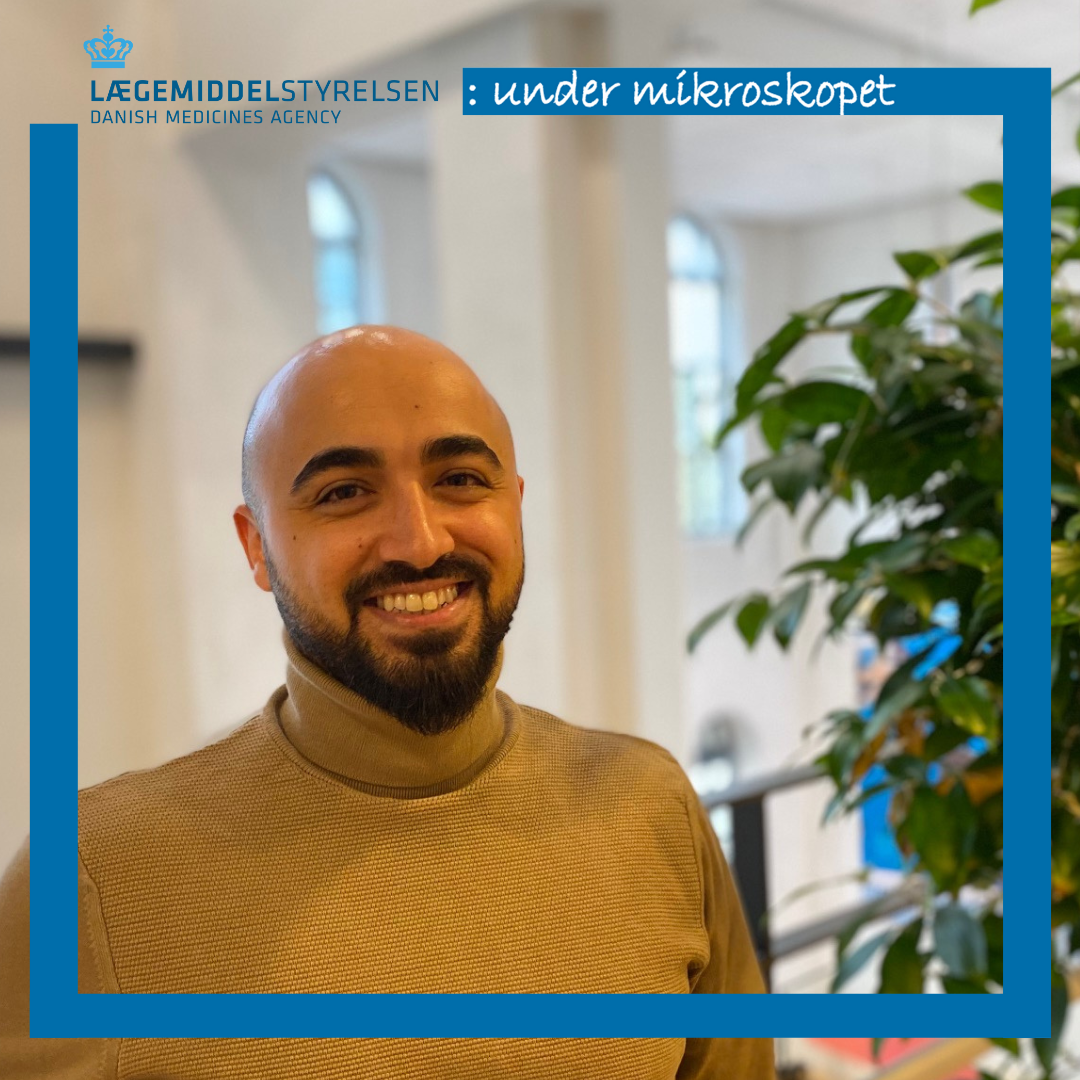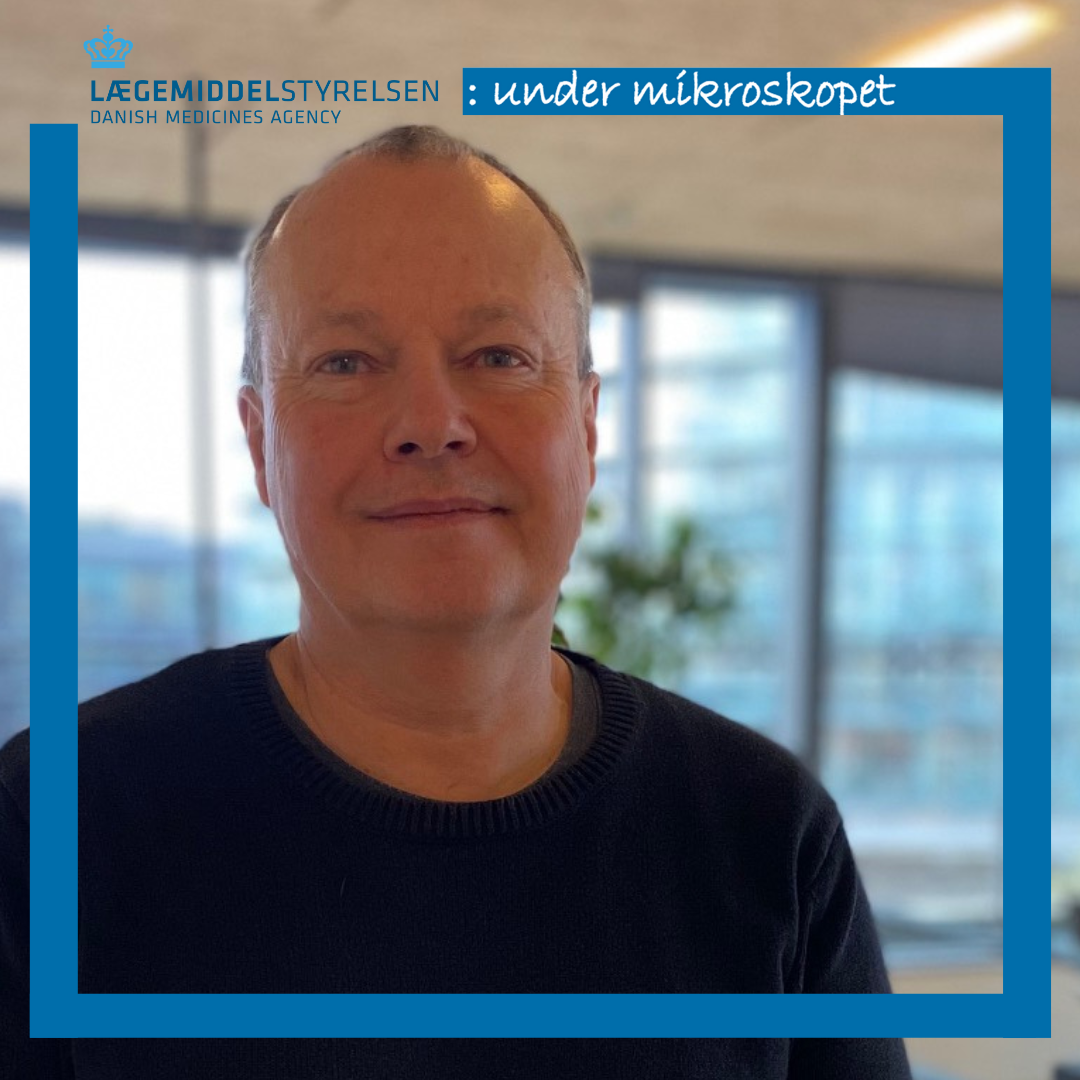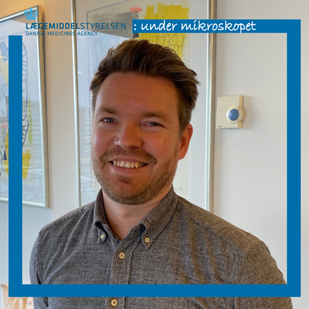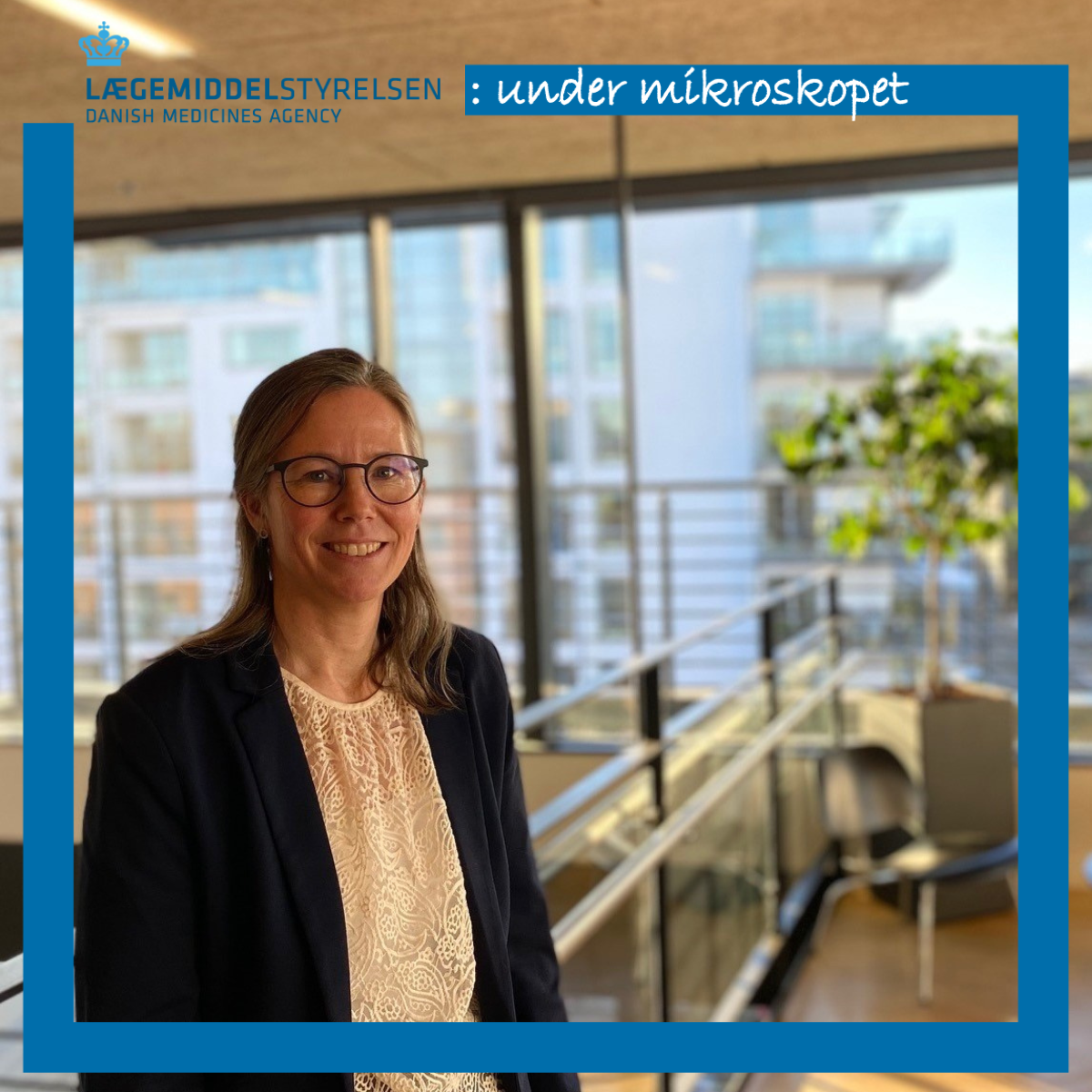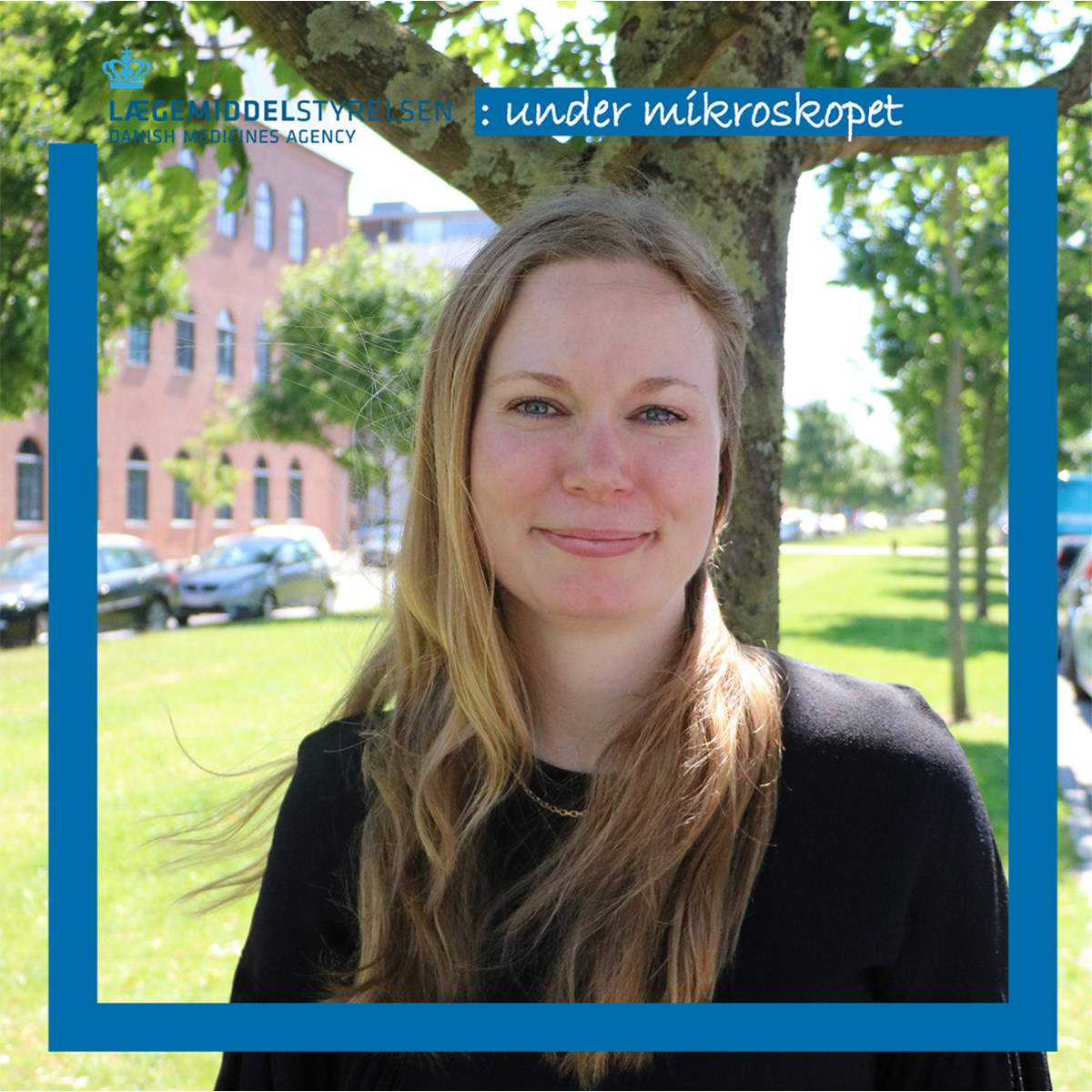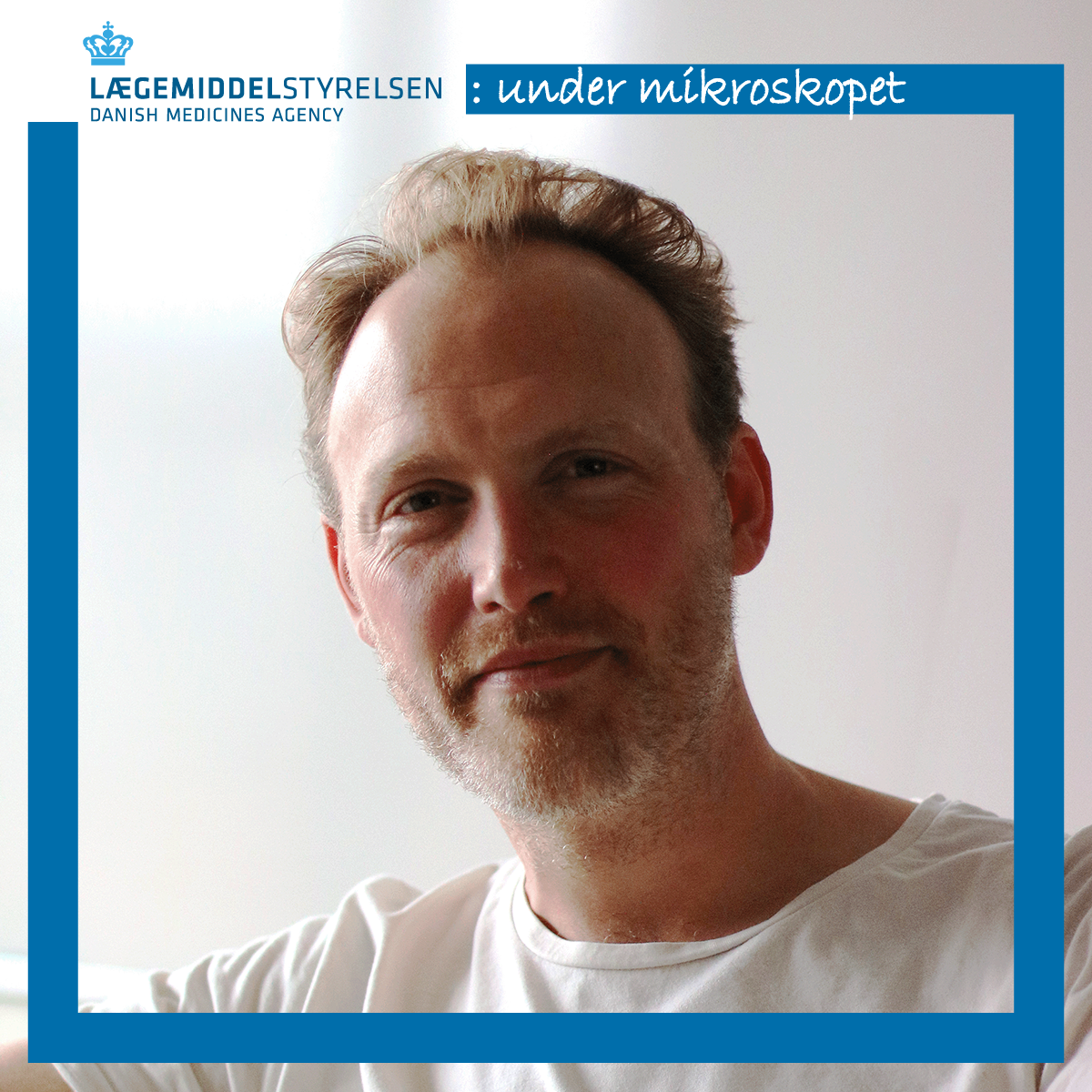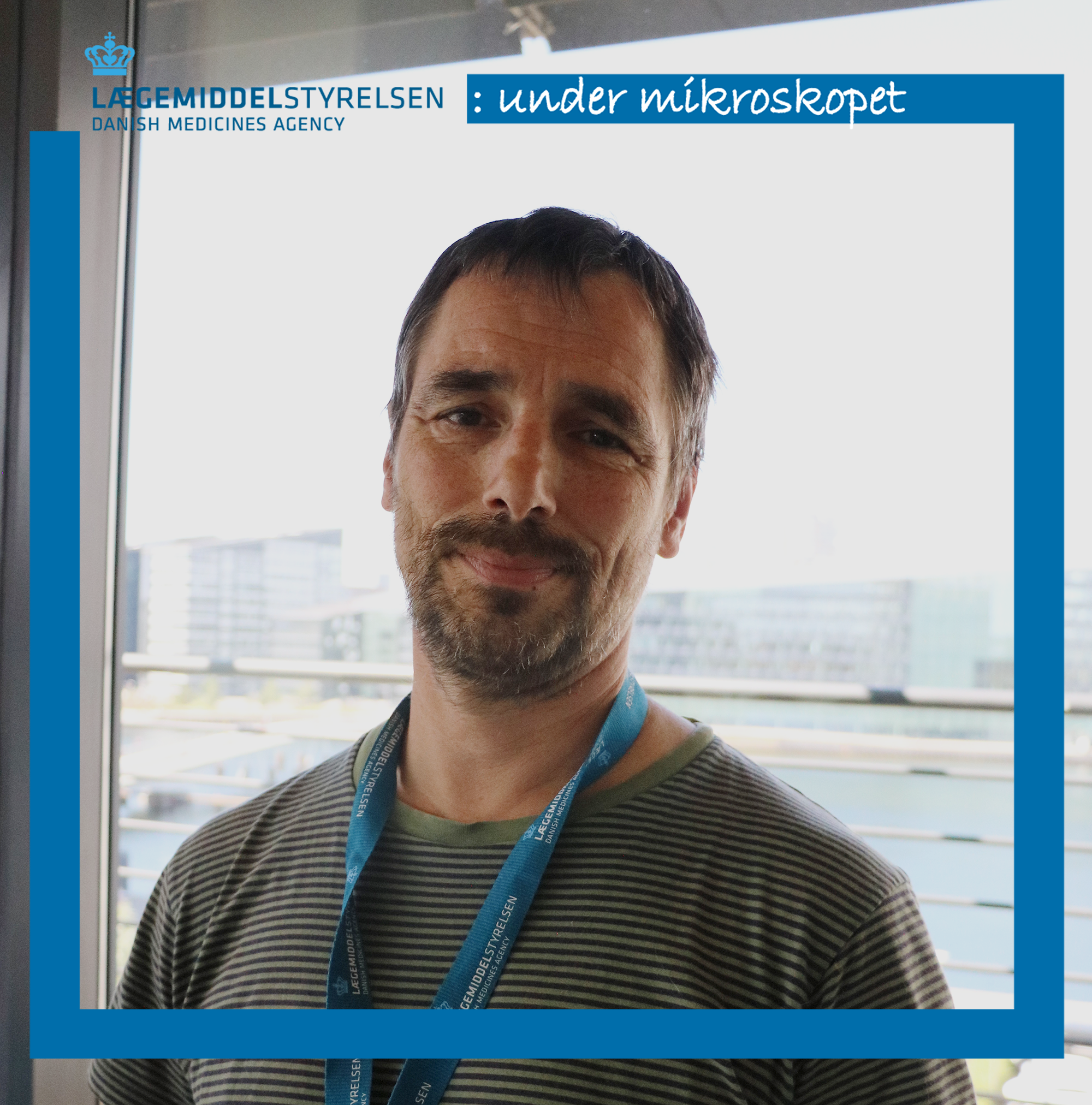Under the microscope

Under the microscope
Meet case officer Dafina Sllamniku
What can we do better tomorrow?
Above: Dafina Sllamniku, case officer, Quality Assessment & Clinical Trials, Review Workflow
Improvements, changes and new methods. These are elements of case officer Dafina Sllamniku’s daily routine in her role of handling anything from marketing authorisations to important inquiries received by the department.
Dafina brings a wealth of knowledge of access to documents and the administrative universe in the health sector from previous positions, and we are lucky to have her working with us every day:
“As a case officer at the Danish Medicines Agency, I am sort of the department’s heartbeat, pulsing cases through to the right people and ensuring that our internal processes are of a high standard. I am also responsible for important areas within the future of medicinal products in my role of reviewing marketing authorisations when pharmaceutical companies apply for approval of their medicinal products for sale in Denmark and Europe,” she says and continues:
“Because I work with areas of clear benefit to society, I am always on the lookout for ways we can improve so we can work smarter tomorrow. The people here are incredibly receptive to this and have a particular focus on establishing learning communities internally where we can exchange ideas and get new solutions off the ground. It gives me good energy because I appreciate socialising with colleagues and enjoy getting out of my office “bobble”.
Besides her job responsibilities, Dafina is also chairperson/union representative for our employees organised in HK, so it is full speed ahead for our skilled case officer.
Meet pharmacist Saleh Yamollaei
When dreams change
Above: Saleh Yamollaei, pharmacist, Pharmacoeconomics & Availability
While Saleh Yamollaei was studying to become a pharmacist, he was convinced he’d be working in the pharmacy industry. But once he realised that he could use his skills to give Danish patients a better medication compliance in their daily lives, his dream job changed.
Saleh now works for us as an expert in the pharmacy area, offering guidance to the public, pharmacies and doctors every day:
“I was sure my dream job was in the industry because I had always enjoyed being in the lab, mixing and measuring. But when I realised that I could bring my pharmacist skills into play from the other side of the table in a regulatory role at the Danish Medicines Agency, that’s when I knew my dream job had changed,” he says and adds:
“In my administrative role, I review anything from and about pharmacies, give advice to citizens on medicines and offer guidance to doctors on how to apply for an exemption to prescribe medication that is normally reserved for specialists. My job is exciting because I work with people from different professions while being in close touch with what's going on in society. And that is really important to me.”
Before Saleh moved from the pharmacy counter to us, he worked for seven years in different pharmacies in Copenhagen. It has given him comprehensive knowledge about pharmacies, which comes in handy especially for the appointment of new proprietary pharmacists across Denmark.
Meet special adviser Jens Rene Bundgaard
A thousand times quality
Above: Jens Rene Bundgaard, special adviser, KMT Centre Support, Projects & Data, Quality & Lean
With responsibility for quality in a department that works with control and security of supply of medicinal products and medical devices in Denmark, ‘quality’ is one word that you will hear often from Jens Rene Bundgaard. His job is to check that the Danish Medicines Agency complies with national and international standards, but he also spends much of his time coordinating and developing our quality systems to ensure everything balances at the agency.
Jens has a degree in chemical engineering from the Technical University of Denmark. He has worked in the hospital sector and most recently filled a position at the Danish Accreditation Fund. But the job at the agency differs markedly from his previous jobs:
“An agency like this is truly a large mix of different skills and expertise. Working here is fun, because so many work with special functions – with me being the one having to stick all these functions together through our quality management systems. It's exciting for someone like me who loves bridging the gap between different professional groups and using my knowledge to create the best systems within quality – for the benefit of the workplace and through that society as a whole,” says Jens and adds:
“On top of that, the Danish Medicines Agency is an inclusive workplace with good opportunities for people to influence matters and get their work out in real life. Seeing exactly where my work creates value is important for me.”
Jens joined the agency on 1 August 2022, but he is already so familiar with the agency that it feels like he has been around for much longer.
Meet senior medical officer Boje Kvorning Pires Ehmsen
Our very own doctor
Above: Boje Kvorning Pires Ehmsen, senior medical officer, Regulatory & Clinical Assessment
After Boje Kvorning Pires Ehmsen completed medical school, he specialised in blood diseases and internal medicine. After a long career in the hospital sector as a specialist at Rigshospitalet and later at the secretariat of the Danish Medicines Council, he felt he had to make a change of path in his professional life. And that’s why Boje now works with us.
“After having worked as a clinical doctor for ten years, I felt that I wanted more influence on my daily work routine. And I must say that I got what I bargained for in my role as medical officer at the Danish Medicines Agency. Here, my primary responsibility is to examine documentation related to clinical trials for cancer medicines, with a particular focus on efficacy and the profile of side effects. We specifically examine whether, for example, more people live longer or are cured by the medicinal product in question, and whether we can accept any side effects compared to the benefits," says Boje and continues:
“In this role, I am also fortunate to have an international dimension via our close collaboration with both the EMA and our European colleagues. It has been an eye-opener for me to see the meaningfulness of our cross-border collaboration when the goal is clear. And I am also motivated by feeling that I am still close to the lives of patients even though I am no longer in my doctor’s coat.”
As a little extra bonus info, we can tell you that Boje has worked as a ship's doctor and a helicopter flight physician in the Danish Defence. That’s awesome!
Meet IT project manager Heidi Engelhardt Bebe
Bridging the gap between the digital world and the daily routine
Above: Heidi Engelhardt Bebe, IT project manager, IT & Digital Transformation
Working as an IT project manager, Heidi Bebe is like a chameleon. She is used to quickly adapting herself to new situations and blending in seamlessly with the surroundings, whether it is to solve technical challenges in the most inner core of a new forms system or to help a colleague achieve a good implementation process. Because new technology is naturally integrated in the agency’s professional assessments and processes, there are numerous digital tasks at the agency.
“The role as IT project manager in the IT & Digital Transformation department offers me a multitude of varied tasks, but common to them all is that I am in contact with incredibly many people. This is really what drives my work: Getting out to talk with many people and hearing what their digital needs are so we can build a strong bridge between their needs and the solutions that we are working to enhance every day”, says Heidi and adds:
“But it is also important for me to see that the solutions I make are launched and become alive in the organisation; that processes become easier, smoother or more efficient. And there are plenty of opportunities to do so here at the agency. You can clearly feel that people want to make a difference and make everything better for the end users, no matter if it is the general public, pharmacies, doctors or other groups.
Heidi joined us on 1 August 2022, switching from a job in the private sector after making a career in the public sector.
Meet Sabina Lysdahl Søgaard
The seconded lawyer that we got to keep
Above: Sabina Lysdahl Søgaard, lawyer, Director General’s Office
When Sabina started working at the #Danish Medicines Agency, we were supposed to give her back. In May 2020, Sabina was hired by the National Committee on Health Research Ethics (NREC) to support the phasing in of the new MD regulation, new legislation within medical devices. In the meantime, the regulation was delayed, and Sabina could then set her foot at the Danish Medicines Agency a couple of months later.
“At first, I had to adjust because I really was quite happy in the position that I left at the NREC. But the way people welcomed me at the Danish Medicines Agency made all the difference.”
Sabina and her fellow colleagues provide services to the management to ensure they get information and legislative updates in the area, and they handle a multitude of other legal tasks.
It wasn't long after joining that Sabina landed two other major tasks:
The establishment of the agency’s whistleblower mechanism and the responsibility for providing secretariat services to the Danish Medicines Agency’s #Citizens’ Council.
The Danish Medicines Agency’s Citizens’ Council is a council with representatives appointed by Danish Patients. The members include representatives from the following patient organisations: Bedre Psykiatri (Better Psychiatry), Danish Epilepsy Association, Danish Kidney Association, Rare Diseases Denmark, Danish Parkinson's Disease Association, Danish Lung Association and Danish Psoriasis Association.
The council is regularly invited to the agency to provide their input on various problem areas. Sabina is responsible for coordinating and selecting the professional topics for the meetings.
“Even though I was only to work there on a seconded basis, I felt very much at ease from day one and on equal footing with the rest of the permanent staff in the Director General’s Office. I was thoroughly instructed in all tasks and got a lot of responsibilities. I found the collaboration and environment in the team and throughout the agency to be very good, and I therefore wanted to stay at the Danish Medicines Agency, and fortunately, opportunity knocked.”
Meet lawyer and postdoc Jakob Wested
Expert in pipe dreams and extremely curious about populations, clinical trials and data analysis
Above: Jakob Wested, lawyer and postdoc, Data Analytics Centre (DAC)
Curiosity runs in Jakob’s blood, and that works to our advantage when he is here working at the Danish Medicines Agency. He goes around the agency talking to people of all professions and gathers input on an ongoing basis. It has been a little over a year since Jakob joined the Danish Medicines Agency’s Data Analytics Center in a research position. The project he is currently devoted to looks at representation and diversity in clinical trials, which involves delving into data, for example to investigate how populations in clinical trials look and to see if they match those who will actually be using the medicine when marketed.
“Representation in clinical trials is important in order to give the individual patient the best treatment and minimise the risk of side effects. But it is also important because more and more decisions in the healthcare sector are data-driven. Therefore, it is important that we generally pay attention to any imbalances – bias – in our data basis.”
Pipe dreams and practical dimensions
“As a researcher, you may find yourself chasing pipe dreams from your desk. You are dependent on input from different professional experts to fully comprehend the problems and find good answers and solutions. I wanted to have the practical dimension included and see my work translated to the real world, making it possible for me to work with data analysis and exchange ideas with a wide range of professions.”
“Across the agency, experts in their respective fields have been open and professionally inclusive, giving me the opportunity to really delve into the subject matter. My colleagues generously share their expert knowledge. It is inspiring and makes my job better and more fun.”
We are so pleased to have Jakob with us – the Danish Medicines Agency is a good place for people who are keen to get wiser and have a natural curiosity. It is better to ask one question too many than too little when it can benefit people, animals and society and help ensure the availability of safe, effective and accessible medicinal products and medical devices.
Meet biostatistician Claus Bang Pedersen
Here’s Claus – a man with an eye for data and patterns
Above: Claus Bang Pedersen, biostatistician, Data Analytics Centre (DAC)
Claus has a degree in biostatistics and has been working in the Danish Medicines Agency’s Data Analytics Centre since 2021. But his assignments extend around the agency. For example, Claus provides input to companies and sponsors as part of the guidance the agency offers to the medical device industry.
“I come from the industry and have gained a lot of experience with the kind of problems that companies would seek advice about from the Danish Medicines Agency. The dialogue with the sponsors, the ones conducting clinical trials, enables us to work our way to the most suitable trial design together. Being able to conduct good clinical trials that will ultimately benefit patients is what makes sense to me,” Claus elaborates.
It is a daily routine for Claus to look at data – including the data that are gathered when new medicines are tested in trial participants. Clinical trials look at how a medicinal product works, the side effects it causes, and how it is metabolised in the body. The results from a group of trial participants given the medicinal product and a group given a placebo are compared. Claus looks at whether the trial is composed in the most appropriate way.
But why is that important?
It's important because we must ensure that the clinical trials give us details about the things we want to know. This includes being careful not to misinterpret results, say, if we are testing several hypotheses at a time.
“Shooting three arrows at a target gives you a better chance of achieving a good result than if you had just one arrow, but it will say nothing about your skills as an archer. When you are testing three hypotheses in the same clinical trial, you will have to consider the repetitions, which do not necessarily say anything about the medicine’s effect,” explains Claus.
“The gold standard in clinical trials is also for everything to be planned in advance in a phase 3 trial, basically with the aim of confirming a pre-defined hypothesis using the data gathered from this phase of the clinical trial. But sometimes it may be necessary to make changes along the way, and we, as an authority, always consider this carefully when we evaluate the results of clinical trials and approve medicinal products in general.”

